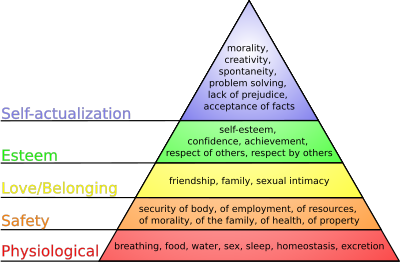 Maslow's hierarchy of needs is one of the first concepts taught in most early management and psychology classes. Although there is debate around the framework (especially around the belief that human needs are actually ranked), Maslow's hierarchy is still generally regarded as an important and valuable lens for evaluating human needs.
Maslow's hierarchy of needs is one of the first concepts taught in most early management and psychology classes. Although there is debate around the framework (especially around the belief that human needs are actually ranked), Maslow's hierarchy is still generally regarded as an important and valuable lens for evaluating human needs.The gist of the theory is that humans have different levels of needs (starting at the bottom of the pyramid) and that we work to meet the bottom needs first before moving to fulfill the next set of needs. Sleep is more important than friendship, water is more important than security, etc.
When I take a non-scientific look at how the mainstream Internet has evolved - following the initial few years of the "getting to know you" period - it seems to follow the hierarchy pretty well:
- Initial communication over the Internet was relatively basic and mimicked the patterns of earlier forms of communication - facilitating basic needs. In addition, the pornography industry was one of the earliest widespread adopters of the Internet - as is usually the case with new technology.
- We soon realized that more sophisticated communication was possible over the Internet. The government began to develop simple ways of communicating with the wider population. Websites for health (WebMD), employment (Monster), financial services, and all forms of factual reference quickly multiplied.
- Real-time communication including instant messengers, chat, webcams, and now VOIP-services has further augmented our ability to communicate intimately. In addition, the mainstream acceptance of Internet dating has come to fulfill our need for Love.
- The proliferation of social networking worked to meet our esteem needs. From personal expression (MySpace) to friendly networks (Facebook) to professional networks (LinkedIn), social networking has allowed us to build a digital persona where virtual respect is coveted.
- Finally, the services that will fulfill the top needs are still in a state of fluid development. Crowdsourcing offerings like Wikipedia and Innocentive seem to be a natural way to fulfill our need for self-actualization. But there is still plenty of room and probably the greatest level of opportunity for new offerings.
